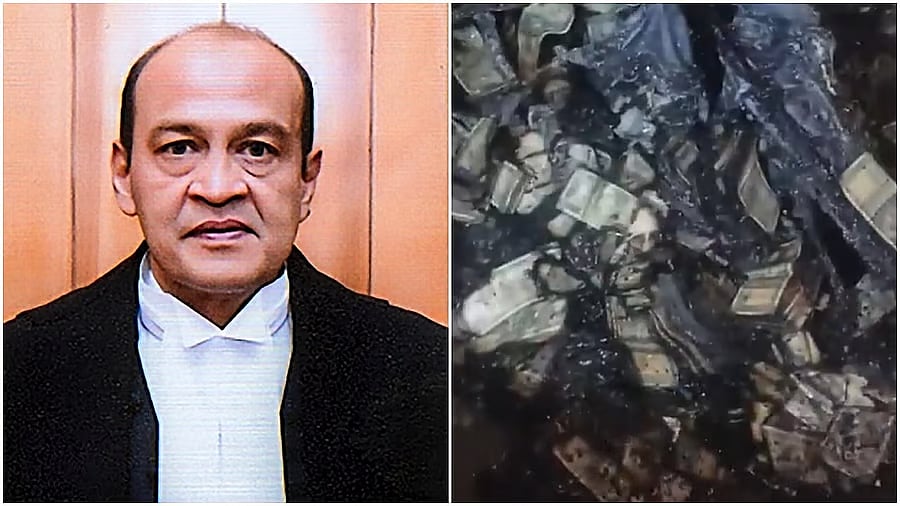
Justice Yashwant Varma; Photo of cash allegedly discovered at a storeroom at Justice Varma's house.
Credit: X/@ANI; PTI
A notice presented by the Opposition for a motion to remove Justice Yashwant Varma — the Allahabad Court judge embroiled in a controversy over the recovery of cash at his residence — has created a stir, culminating in the resignation of Vice President Jagdeep Dhankhar. Sumit Pande explains the process of impeachment of a member of the higher judiciary by Parliament.
What does the Constitution say about the impeachment of a judge?
Impeachment is a colloquial term. The Constitution has two articles that lay down the process for the removal of a judge from office — Article 124 (4) for Supreme Court judges and Article 218 for high court judges. In both cases, judges can be removed from their position for “proven misbehaviour or incapacity” on an order passed by the President of India after such a motion is approved by both houses of Parliament.
How does Parliament impeach a sitting judge in the higher judiciary?
The Judges (Inquiry) Act, 1968, defines the procedure for the investigation and proof of the misbehaviour or incapacity. The impeachment process can be initiated in either house of Parliament. At least 100 Lok Sabha MPs, or at least 50 Rajya Sabha MPs, need to sign a notice for the motion. The presiding officer of the House can then decide to admit or refuse the motion.
Once the LS Speaker or RS Chairperson admits the motion, a 3-member committee comprising an SC judge, an HC Chief Justice and a distinguished jurist is constituted. If the inquiry committee finds that the judge is not guilty, the matter ends there. If the panel finds merit in allegations, the House may proceed to debate and vote on the motion.
How does the outcome of the investigation guide impeachment proceedings?
The motion for the removal of the judge remains pending till the 3-member probe panel submits its report. If the committee exonerates the judge, no further action is taken. If the judge is found guilty, the motion for removal, along with the investigation report, is taken up for consideration by the House or Houses of Parliament.
How is the motion voted on by Parliament?
The judge or the nominee is allowed to present their case before Parliament. When it comes to voting, the motion has to be passed by a special majority — that is, by the support of two-thirds members present and voting, which should not be less than half of the total strength of the House. The process has to be repeated in the other House. If approved, Parliament sends an address to the President seeking the judge's removal.
Has a judge ever been impeached by Parliament?
Justice V Ramaswami was the first SC judge to face an impeachment motion over allegations of extravagant expenditure during his tenure as the Chief Justice of the Punjab and Haryana High Court. The motion, which was moved in 1993, was defeated in the Lok Sabha. The impeachment motion against Justice Soumitra Sen of the Calcutta HC was passed by the Rajya Sabha in 2011. But the judge resigned before the matter could be taken up by the Lok Sabha.
Is there an in-house mechanism in the judiciary for the removal of a judge?
In 1999, the SC adopted guidelines for an “in-house procedure” to investigate allegations against members of the higher judiciary. Under this process, the matter is first looked into by an in-house committee. If the allegations are found to be true, the CJI can ask the judge in question to resign. If the judge refuses, the CJI informs the Prime Minister and President, asking them to start parliamentary proceedings for removal. If the allegations are found to be true, but not of a serious nature, the CJI can speak to the judge and give necessary advice. The proceedings are scrapped if the allegations are found to be false.